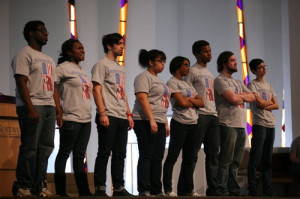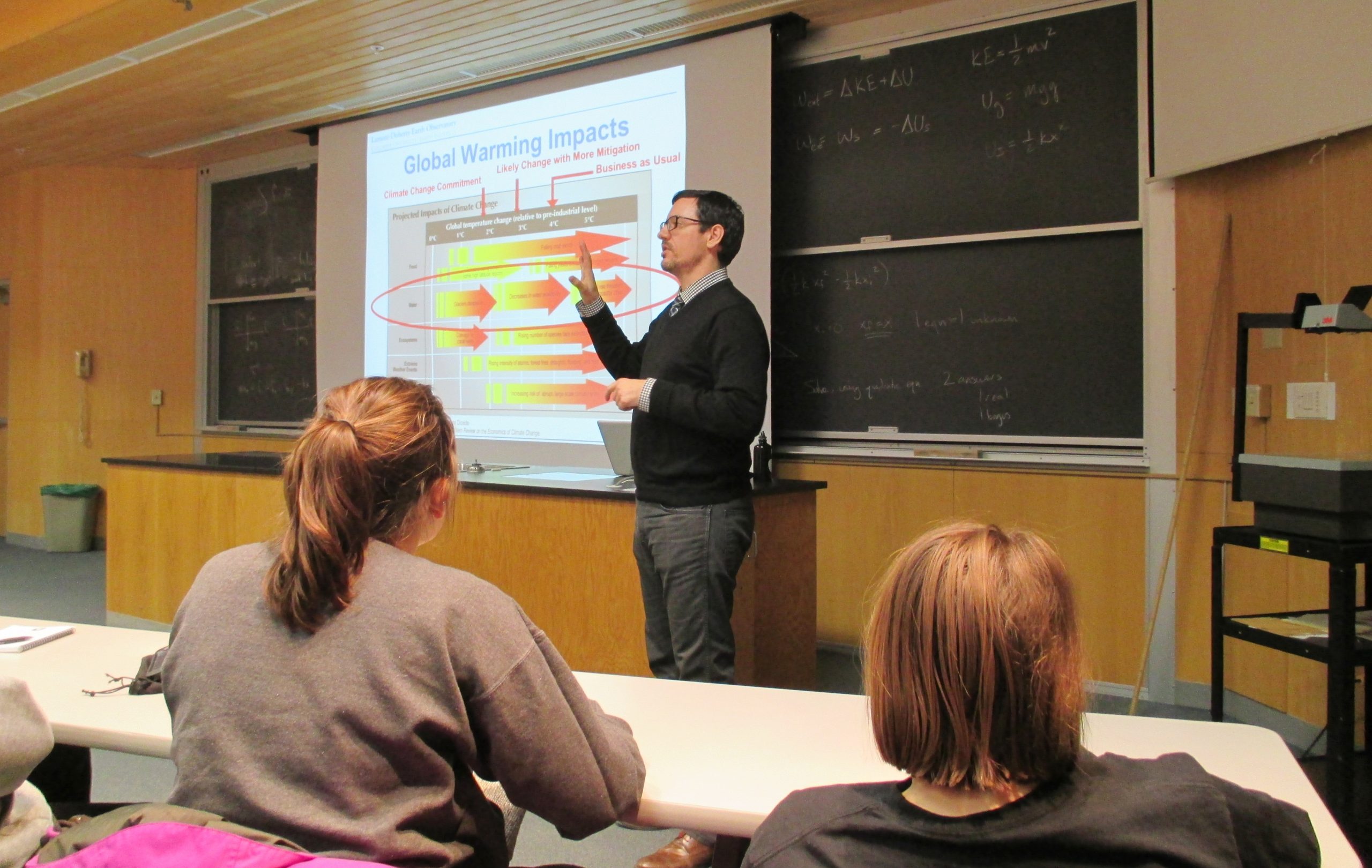Strolling around campus lately, students have likely noticed the signs announcing the upcoming Building Bridges Conference. This year’s theme, “Disposable Communities? Demanding Environmental Justice,” has included two scheduled preview lectures in addition to the week of activities leading up to the event.
On Thursday, Feb. 4, Dr. Jason Smerdon, Professor at Lamont-Doherty Earth Observatory at Columbia University, presented the lecture entitled, “Drip, Drip, Drip: Water, Climate Change, and Tales of Want and Excess in the 21st Century.”
The lecture, “Climate Change- What do we know and what can we do?”was scheduled for Feb. 21 with Dr. John Abraham, Professor of Thermal and Fluid Science at the University of St. Thomas, but was postponed due to the weather.
The two Building Bridges preview lectures were sponsored in partnership with the Biology, Chemistry, Environmental Studies, Geology, and Physics Departments.
Professor Charles Niederriter of the Physics Department said that the Building Bridges Conference topic this year provided an opportunity to use funding from the National Science Foundation to sponsor the speakers in an effort to “warm up the crowd” as has been done with the Nobel Conferences in the past in promotion of the upcoming conference’s environmental theme.
“It’s amazing how lucky we are, we really take water for granted, yet around the world fresh, clean water is not common,” Niederriter said.
Smerdon, a 1998 Gustavus graduate with a PhD in Applied Physics, said that the conversation about climate change has been evolving, moving from questions about the evidence supporting the existence of global warming toward the study of the impacts and consequences of climate change.
“Being able to talk about water is a really important part of the climate change story, the hydrological cycle is going to be changed significantly as a result of global warming, and its impacts are things that we need to be thinking about,” Smerdon said.
Focusing on the shifting of extreme concentrations of precipitation, Smerdon emphasized that areas that already experience drought will become even more burdened by a lack of water, and other global areas will be at an increased risk of severe flooding and other weather phenomena.
“From the perspective of Building Bridges, the environmental injustice issue is really encapsulated in the water problem, because climate change will affect the hydrological cycle unevenly. The changes in water availability and the consequences for precipitation and drought will be unevenly felt, and it’s definitely a sad truth of the climate change issue that many of the people who will be impacted most by climate change are those who have had the least to do with creating the problem in the first place and have the least resources for basically adapting to the changes that we can expect, and that’s a global environmental justice issue, and it’s something that is central to how we think about this on a global scale and the way that we consider who this will affect and who’s responsible for addressing it,” Smerdon said.
Noting that the broad scientific community has reached a consensus that Earth is warming, Smerdon also stressed the importance that current students recognize the real presence of climate change and work toward sustainable goals for the future.

Beginning on Monday, March 3, through the week leading up to the Building Bridges Conference on Saturday, March 8, a series of events will serve to further set the stage for the main event, such as an Environmental Justice Workshop sponsored by I Am We Are, “Speed Faithing for Environmental Justice in partnership with Mosaic,” a trivia night centered around the conference’s theme, and GAC’s Got Talent, a student variety show.
With the support of faculty advisors, Building Bridges is an entirely student produced event, Morgan Timm, co-chair of the Action Piece Committee, said.
The conference’s theme relates to environmental issues, such as the Keystone XL Pipeline and other current environmental issues within Minnesota.
“It’s definitely a super important social justice topic; it’s something that is really pertinent considering all of the issues with climate change that are going on,” Timm said
On Saturday, the day kicks off at 9 a.m. in Christ Chapel with opening remarks from Building Bridges Co-Chairs Kelly Dumais and Mark Zorrilla. The social justice theater group I Am We Are will also perform.
Van Jones, the keynote speaker, will deliver his address at 10 a.m., followed by a Q&A session. Jones has authored several books on environmental and civil rights activism, and was named special adviser for the White House Council for Environmental Equality by the Obama administration.
“Environmental justice is the idea that our economic and environmental decisions should not disproportionately affect people of lower socioeconomic status, and communities of color,” Timm said.
“We don’t think about it, but when we recycle something the people that are dealing with the toxins from whatever we just recycled are not middle class Gustavus students, they are typically poorer, minority groups, so that is what the topic is really addressing,” she added.
At 1 p.m., environmental justice advocate Alexie Torres-Fleming will deliver the other keynote address. The afternoon will also feature several workshop sessions led by presenters such as Karen Clark, member of the Minnesota House of Representatives, Lea Foushee, Shalini Gupta, and Karen Monahan.
Also featured will be the Earth Guardians, 13-year-old Xiuhtezcatl Roske-Martinez and 9-year-old Itzcuahtli Roske-Martinez.
“They are pretty awesome, they write rap music on environmental justice,” Timm said of the young duo.
The afternoon will also include the Action Piece, which Timm said will focus on sulfide mining in communities like Ely, Minnesota. It will explore the consequences on jobs in the communities’ declining economies in contrast with health effects, inevitable sulfide pollution, and potential pollution of the Boundary Waters.
“Either you pick the environment or you pick jobs, and either way you’re throwing away an aspect of the community. That’s what makes it so difficult, and that’s what makes it so great in illustrating that we need to not have to make this decision. We need to reframe the system in a way that doesn’t force us to choose between jobs and the environment,” Timm said.
Timm encouraged students to attend the conference, noting the significance of honoring the college’s pillar of Justice and the efforts of the students in the Gustavus community.
“The reality is that we contribute to the larger system, and the system needs to change,” Timm said.
Students receive admission to the events on Saturday with a free ticket which can be reserved at gustavustickets.com.
